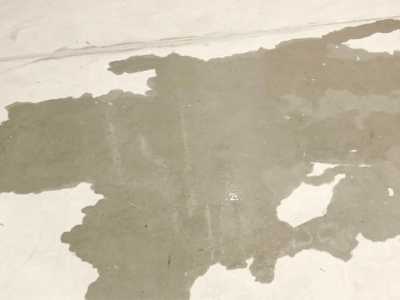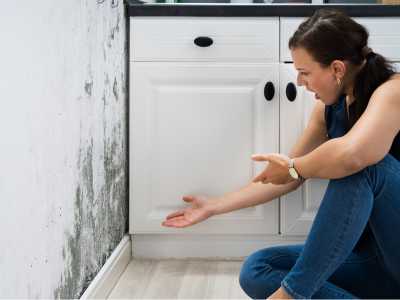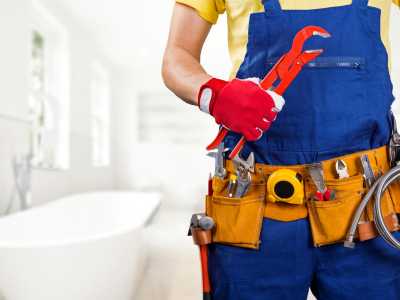A slab leak is a type of plumbing leak that occurs under the concrete foundation of a home or building. These leaks can be difficult to detect and can cause significant damage if left untreated.
In this blog post, we will discuss the common signs of a slab leak and the importance of using slab leak detection equipment to identify and repair these leaks.

What is a Slab Leak?
A slab leak is a leak that occurs in the water lines that run under the concrete foundation of a home or building. These leaks can be caused by a variety of factors, including shifting soil, corrosion, and poor installation. Slab leaks can be difficult to detect because they are hidden under the foundation and can go unnoticed for long periods of time.
Importance of Slab Leak Detection
Slab leaks can cause significant damage if left untreated. They can lead to mold growth, foundation damage, and high water bills. That's why it's important to use slab leak detection equipment to identify and repair these leaks as soon as possible.
Slab leak detection equipment uses advanced technology to locate leaks under the concrete foundation without causing damage to the structure. This equipment includes electronic amplification equipment, electromagnetic pipeline locators, and infrared cameras. These tools allow plumbers to pinpoint the exact location of the leak and make necessary repairs without causing unnecessary damage to the property.
Common Signs of a Water leak under the Slab
Here are some of the most common signs of a slab leak that you should be aware of:
High Water Bills
One of the first signs of a slab leak is a sudden increase in your water bill. If you notice a significant increase in your water bill without any changes in your water usage, it could be a sign of a slab leak. It's important to monitor your water bill and investigate any sudden spikes in usage.
Low Water Pressure
A slab leak can also cause a decrease in water pressure. If you notice a decrease in water pressure in your home or building, it could be a sign of a slab leak. This is because the water is leaking out of the pipes before it reaches your faucets and fixtures.
Wet Spots on the Floor
If you notice wet spots on your floor, it could be a sign of a slab leak. These wet spots may appear in different areas of your home or building, depending on where the leak is located. If you notice wet spots on your floor, it's important to investigate the cause and contact a plumber for further inspection.

Mold Growth
Slab leaks can also lead to mold growth. If you notice mold growing on your walls, floors, or ceilings, it could be a sign of a slab leak. This is because the moisture from the leak creates the perfect environment for mold to grow. If you notice mold growth, it's important to address the issue immediately to prevent further damage and potential health hazards.
Cracks in the Foundation
Slab leaks can also cause cracks in the foundation of your home or building. As the water from the leak seeps into the soil, it can cause the foundation to shift and crack. If you notice cracks in your foundation, it's important to have them inspected by a professional to determine the cause and make necessary repairs.
Hot Spots on the Floor
If you have a hot water slab leak, you may notice hot spots on your floor. This is because the hot water is leaking out of the pipes and heating up the concrete. If you notice hot spots on your floor, it's important to have a plumber inspect the area for a possible slab leak.
Sound of Running Water
If you hear the sound of running water when all of your faucets and fixtures are turned off, it could be a sign of a slab leak. This is because the water is leaking out of the pipes and can be heard under the concrete foundation. If you hear the sound of running water, it's important to have a plumber inspect your home or building for a possible slab leak.
What to Do if You Suspect a Slab Leak
If you suspect a slab leak in your home or building, it's important to take immediate action. Here are the steps you should follow:
Turn Off the Water
The first thing you should do is turn off the main water supply to your home or building. This will prevent any further damage from occurring while you wait for a plumber to inspect and repair the leak.

Contact a Professional Plumber
It's important to contact a professional plumber (such as Engle Services) who specializes in slab leak detection and repair. They will have the necessary equipment and expertise to locate and repair the leak without causing unnecessary damage to your property.
Document the Damage
It's important to document any damage caused by the slab leak. Take photos and videos of the wet spots, mold growth, and cracks in the foundation. This documentation will be useful when filing an insurance claim for the repairs.
Contact Your Insurance Company
If you have homeowner's insurance, you may be covered for the cost of repairs for a slab leak. Contact your insurance company to determine your coverage and file a claim if necessary.
Conclusion
Slab leaks can cause significant damage if left untreated. It's important to be aware of the common signs of a slab leak and take immediate action if you suspect a leak in your home or building. By using slab leak detection equipment and working with a professional plumber, you can identify and repair slab leaks before they cause extensive damage. Remember to monitor your water bill and be on the lookout for any signs of a slab leak to prevent costly repairs in the future.
Engle Services offers comprehensive plumbing services, including water leak repair and plumbing inspections, in Sylacauga,
Talladega, Birmingham, Shelby County (Hoover, Chelsea), Alabaster, Pell City, Dadeville, Wetumpka, Montgomery and all their surrounding areas.
Ready to schedule with our team of HVAC Technicians, Electricians, and Plumbers?
Schedule an appointment online or give us a call at (855) GET-ENGLE
